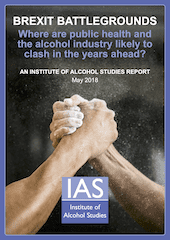View this report

There remains significant uncertainty over what Britain’s exit from the EU means for alcohol policy.
Thus far public health groups have made proposals in four broad policy areas to protect health following Brexit:
- Explicit protection for public health in future Trade and Investment Agreements (TIAs) to ensure industry cannot legally challenge regulations
- Rationalisation of the duty system to ensure stronger products are taxed at a higher rate
- Labelling requirements for products to display nutritional information and health warnings
- Stronger restrictions on marketing
By contrast, alcohol industry groups’ demands are more detailed and numerous:
- Many of these seek to maintain the status quo and minimise disruption the industry; as such they do not have clear public health implications
- Others are more ambiguous as to their consequences, such as calls to lower tax on lower strength products and efforts to maintain current free trade guarantees, and so require careful scrutiny
However, there are three areas where the industry agenda is particularly alarming, and ought to be resisted by public health groups:
- Attempts to encourage tax competition and to weaken regulation (including labelling requirements) by including them among non-tariff barriers to trade
- Attempts to increase industry influence over policy through participation in trade discussions, and developing ‘model agreements’ for the government to adopt wholesale
- Attempts to increase access to emerging markets with the greatest prospects for aggressive growth
View this report
